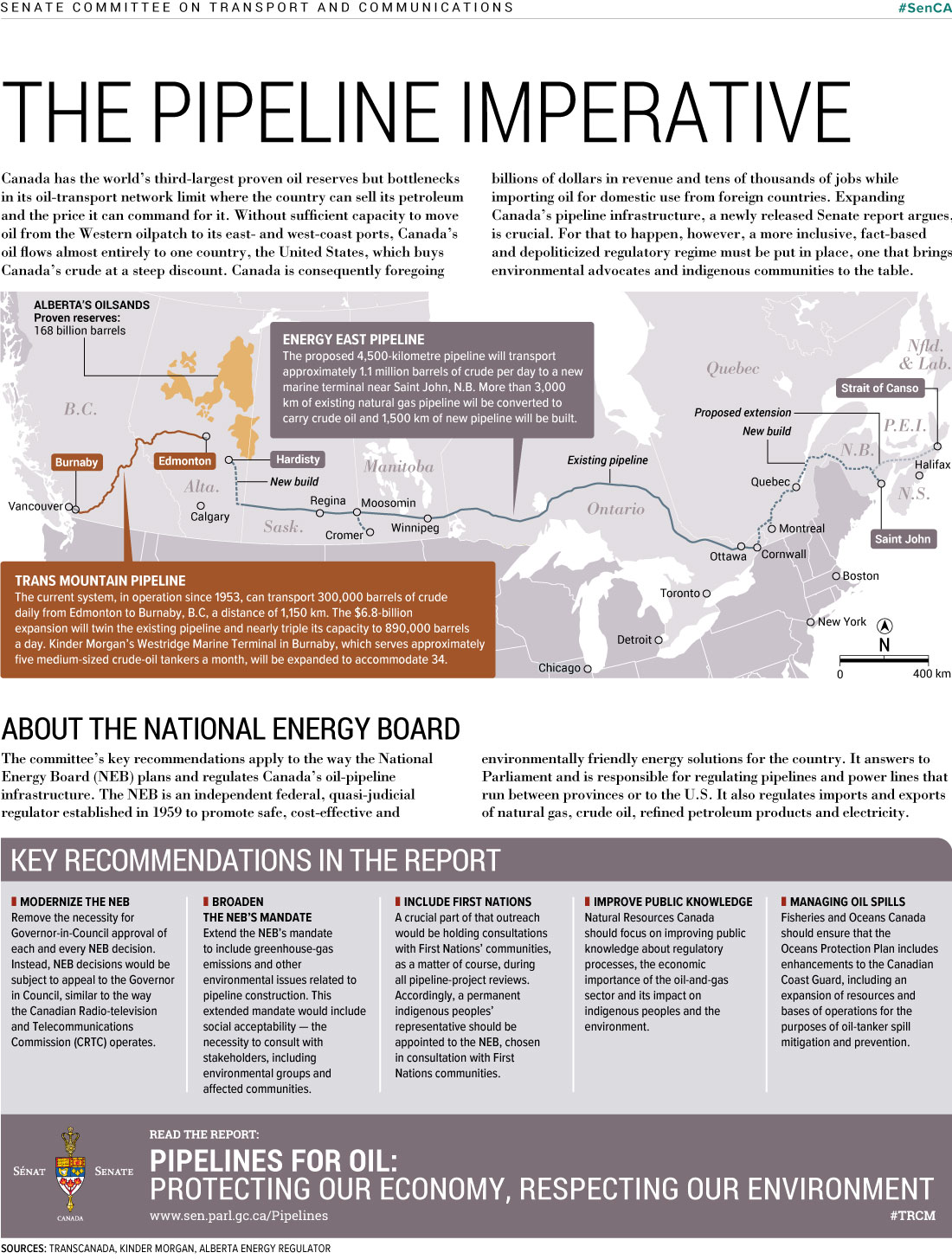Pipelines: Protecting our economy, respecting our environment

The Senate committee on Transport and Communications released its interim report called Pipelines for Oil: Protecting our economy, respecting our environment at a press conference in Ottawa on December 7.
During the past few months, the Committee has conducted public hearings and fact-finding missions in Edmonton, Calgary, Vancouver, Montreal, Saint John, Halifax and Port Hawkesbury. As a result, the committee developed a strategy to facilitate the transportation of crude oil to eastern Canadian refineries and to ports on the east and west coasts of Canada.
During the press conference, Senators Michael MacDonald, Terry Mercer and Pierre-Hughes Boisvenu shared the committee’s recommendations as well as the risks and benefits of various options linked to projects regarding the transportation of crude oil.
Senators said the National Energy Board should be modernized and given a broader mandate to consider environmental and Indigenous concerns when hearing pipeline proposals.
A stronger, more inclusive and less political regulatory process is an essential first step towards expanding Canada’s energy infrastructure in a way that maximizes economic benefit and minimizes environmental risk while achieving broader public consensus. Modernizing the energy board is just one of the recommendations the committee has made.
Read More: Pipeline Expansion Needs Responsible, Balanced Approached
Allowing the board to consider environmental and Indigenous concerns would make the regulatory process more legitimate and productive. The committee is specifically recommending establishing a permanent Indigenous peoples’ representative on the board to provide assurances to Indigenous communities that the board is receptive to their views.
The committee is also recommending removing final approval for board decisions from the Governor in Council (the Governor General, acting on the advice of cabinet). The current requirement for final approval from cabinet virtually guarantees the regulatory process is highly politicized rather than decided on the merits of the proposal at hand.


Related articles
Tags
Committee news
Pipelines: Protecting our economy, respecting our environment

The Senate committee on Transport and Communications released its interim report called Pipelines for Oil: Protecting our economy, respecting our environment at a press conference in Ottawa on December 7.
During the past few months, the Committee has conducted public hearings and fact-finding missions in Edmonton, Calgary, Vancouver, Montreal, Saint John, Halifax and Port Hawkesbury. As a result, the committee developed a strategy to facilitate the transportation of crude oil to eastern Canadian refineries and to ports on the east and west coasts of Canada.
During the press conference, Senators Michael MacDonald, Terry Mercer and Pierre-Hughes Boisvenu shared the committee’s recommendations as well as the risks and benefits of various options linked to projects regarding the transportation of crude oil.
Senators said the National Energy Board should be modernized and given a broader mandate to consider environmental and Indigenous concerns when hearing pipeline proposals.
A stronger, more inclusive and less political regulatory process is an essential first step towards expanding Canada’s energy infrastructure in a way that maximizes economic benefit and minimizes environmental risk while achieving broader public consensus. Modernizing the energy board is just one of the recommendations the committee has made.
Read More: Pipeline Expansion Needs Responsible, Balanced Approached
Allowing the board to consider environmental and Indigenous concerns would make the regulatory process more legitimate and productive. The committee is specifically recommending establishing a permanent Indigenous peoples’ representative on the board to provide assurances to Indigenous communities that the board is receptive to their views.
The committee is also recommending removing final approval for board decisions from the Governor in Council (the Governor General, acting on the advice of cabinet). The current requirement for final approval from cabinet virtually guarantees the regulatory process is highly politicized rather than decided on the merits of the proposal at hand.




